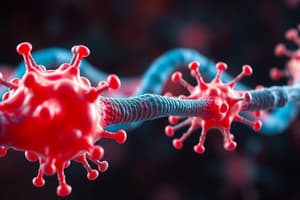Podcast
Questions and Answers
What is the main purpose of Phase 1 clinical trials?
What is the main purpose of Phase 1 clinical trials?
To evaluate the safety, dosage, and side effects of the new drug.
What is the main goal of Phase 2 clinical trials?
What is the main goal of Phase 2 clinical trials?
To determine the efficacy of the drug and continue to monitor safety and side effects.
How do covalent bonds between a drug and receptor differ from non-covalent bonds?
How do covalent bonds between a drug and receptor differ from non-covalent bonds?
Covalent bonds are strong and irreversible, while non-covalent bonds are weaker and reversible.
What is the relationship between a drug's affinity and its potency?
What is the relationship between a drug's affinity and its potency?
How do target-ligand interactions affect drug efficacy?
How do target-ligand interactions affect drug efficacy?
What is the main purpose of Phase 3 clinical trials?
What is the main purpose of Phase 3 clinical trials?
How do pharmacokinetic properties, such as bioavailability, affect a drug's efficacy?
How do pharmacokinetic properties, such as bioavailability, affect a drug's efficacy?
What is the relationship between a drug's affinity and its selectivity?
What is the relationship between a drug's affinity and its selectivity?
How do target-ligand interactions influence a drug's potency?
How do target-ligand interactions influence a drug's potency?
What is the main purpose of the post-market evaluation stage in the drug development process?
What is the main purpose of the post-market evaluation stage in the drug development process?
Study Notes
Drug-Receptor Interactions
- Efficacy refers to the greatest effect a drug can produce, measured by Emax, where a greater Emax indicates higher efficacy.
- Maximal efficacy is achieved when all receptors are occupied, and introducing more drugs does not change the response.
- Potency is measured by EC50/ED50/Kd, where a lower EC50 indicates higher potency, requiring a smaller dose to generate a specific effect.
Properties of a Good Drug
- Biochemical properties: highly selective and specific, high affinity, potency, and efficacy.
- Physiochemical properties: solubility, permeability, stability, pharmacokinetics, and toxicity, including absorption, distribution, metabolism, excretion, half-life, and bioavailability.
- LD50 is the dose required to kill 50% of test animals.
Affinity
- Non-covalent interactions: weaker but more selective, requiring a precise fit between the drug and its target.
- Most drug-receptor interactions occur through ionic bonding, hydrogen bonds, or hydrophobic interactions.
- Hydrophobic effect: lipophilic drugs interact with hydrophobic pockets within receptors, excluding surrounding water molecules.
- Covalent bonds: strong and irreversible, but lacking selectivity, and can modify the DNA of surrounding healthy cells.
Drug Development Stages
- Stage 2: In silico, computer-aided drug discovery (CADD).
- Stage 3: Clinical trials, consisting of Phase 1 (safety, dosage, and side effects), Phase 2 (efficacy and side effects), and Phase 3 (effectiveness, side effects, and comparison with other drugs).
- Stage 4-5: Review, approval, and post-market evaluation.
Studying That Suits You
Use AI to generate personalized quizzes and flashcards to suit your learning preferences.
Description
Explore the concept of efficacy in pharmacology, understanding how drug-receptor complexes impact cellular responses, and the relationship between affinity and efficacy. Learn about Emax as a key value for efficacy and the importance of maximal efficacy in drug effectiveness.



